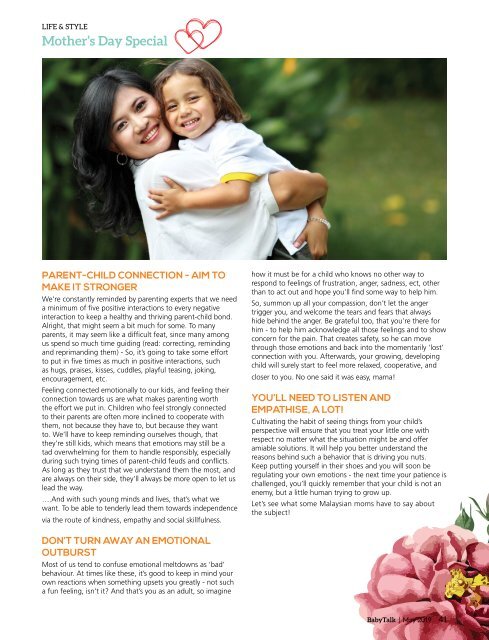Baby Talk May2019
You also want an ePaper? Increase the reach of your titles
YUMPU automatically turns print PDFs into web optimized ePapers that Google loves.
Life & Style<br />
Mother’s Day Special<br />
Parent-child connection - aim to<br />
make it stronger<br />
We’re constantly reminded by parenting experts that we need<br />
a minimum of five positive interactions to every negative<br />
interaction to keep a healthy and thriving parent-child bond.<br />
Alright, that might seem a bit much for some. To many<br />
parents, it may seem like a difficult feat, since many among<br />
us spend so much time guiding (read: correcting, reminding<br />
and reprimanding them) - So, it’s going to take some effort<br />
to put in five times as much in positive interactions, such<br />
as hugs, praises, kisses, cuddles, playful teasing, joking,<br />
encouragement, etc.<br />
Feeling connected emotionally to our kids, and feeling their<br />
connection towards us are what makes parenting worth<br />
the effort we put in. Children who feel strongly connected<br />
to their parents are often more inclined to cooperate with<br />
them, not because they have to, but because they want<br />
to. We’ll have to keep reminding ourselves though, that<br />
they’re still kids, which means that emotions may still be a<br />
tad overwhelming for them to handle responsibly, especially<br />
during such trying times of parent-child feuds and conflicts.<br />
As long as they trust that we understand them the most, and<br />
are always on their side, they’ll always be more open to let us<br />
lead the way.<br />
….And with such young minds and lives, that’s what we<br />
want. To be able to tenderly lead them towards independence<br />
via the route of kindness, empathy and social skillfulness.<br />
how it must be for a child who knows no other way to<br />
respond to feelings of frustration, anger, sadness, ect, other<br />
than to act out and hope you’ll find some way to help him.<br />
So, summon up all your compassion, don’t let the anger<br />
trigger you, and welcome the tears and fears that always<br />
hide behind the anger. Be grateful too, that you’re there for<br />
him - to help him acknowledge all those feelings and to show<br />
concern for the pain. That creates safety, so he can move<br />
through those emotions and back into the momentarily ‘lost’<br />
connection with you. Afterwards, your growing, developing<br />
child will surely start to feel more relaxed, cooperative, and<br />
closer to you. No one said it was easy, mama!<br />
You’ll need to listen and<br />
empathise, a lot!<br />
Cultivating the habit of seeing things from your child’s<br />
perspective will ensure that you treat your little one with<br />
respect no matter what the situation might be and offer<br />
amiable solutions. It will help you better understand the<br />
reasons behind such a behavior that is driving you nuts.<br />
Keep putting yourself in their shoes and you will soon be<br />
regulating your own emotions - the next time your patience is<br />
challenged, you’ll quickly remember that your child is not an<br />
enemy, but a little human trying to grow up.<br />
Let’s see what some Malaysian moms have to say about<br />
the subject!<br />
Don’t turn away an emotional<br />
outburst<br />
Most of us tend to confuse emotional meltdowns as ‘bad’<br />
behaviour. At times like these, it’s good to keep in mind your<br />
own reactions when something upsets you greatly - not such<br />
a fun feeling, isn’t it? And that’s you as an adult, so imagine<br />
<strong>Baby</strong><strong>Talk</strong> | May 2019 41

















